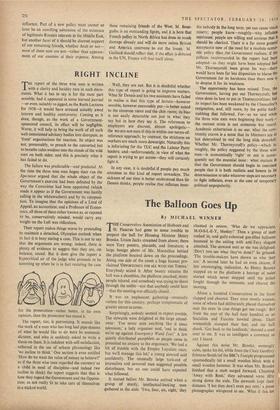RIGHT INCLINE
THE report of the three wise men is written with a clarity and lucidity rare in such docu- ments. What it has to say is for the most part sensible; had it appeared in some learned journal —or even, suitably re-jigged, as the Rejth Lectures for 1958—it would have aroused suitably awed interest and healthy controversy. Coming as it does, though, as the work of a Government- sponsored council, its effect will be negligible. Worse, it will help to bring the work of all such well-intentioned advisory bodies into disrepute, as 'front' organisations for reaction. Its object was not, presumably, to preach to the converted but to breathe calm wisdom into the minds of the wild men on both sides; and this is precisely what it has failed to do.
The failure was predictable—and predicted. At the time the three wise men began their run the Spectator argued that the whole object of the Government's exercise had been defeated by the way the Committee had been appointed (which made it appear as if the Government was hastily calling in the whitewashers) and by its composi- tion. To imagine that the opinions of a Lord of Appeal, an accountant, and a Professor of Econo- mics, all three of them either known as, or reputed to be, conservatively minded, would carry any weight on the Left was ridiculous.
Their report makes things worse by pretending to maintain a detached, Olympian outlook when in fact it is busy stating a case. This is not to say that the arguments are wrong; indeed, there is plenty of evidence to suggest that they are, on balance, sound. But it does give the report a hypocritical air of the judge who pretends to be summing up when he is in fact restating the case for the prosecution—rather better, in his own opinion, than the prosecutor has stated it.
The report, too, is patronising. It sounds like the work of a man who has long had pipe-dreams of what he would like to do were he economic dictator, and who is suddenly asked to write a thesis on them. It is redolent with self-satisfaction, reflected in the use of urbane phraseology like 'we incline to think.' One section is even entitled 'How do we want the value of money to behave?' as if the three wise men regarded the currency as a child in need of discipline—and indeed (we incline to think) the report suggests that that is how they regard the Government and the Opposi- tion; as not really fit to take care of themselves in a wicked world. Well, they are not. But it is doubtful whether this type of report is going to improve matters. What Sir Dennis and his two assistants have failed to realise is that this type of lecture—however sensible, however reasonably put—is better suited to the common room and the club room; its bias is too easily detectable not just in, what they say but in how -they say it. The references to employers are discreet, almost apologetic— the we-are-not-sure-if-this-is-within-our-terms-of- reference approach; by contrast, the strictures on workers are much more downright. Naturally this is infuriating for the TUC and the Labour Party leaders; and—unfortunately, in view of what the report is trying to get across—they will certainly fight it.
In any case, it is doubtful if people pay much attention to this kind of report nowadays. The sickness of our time is better understood than Sir Dennis thinks; people realise that inflation bene- fits nobody In the long term, yet can cause much misery; people know—roughly—why inflation continues; people are willing and anxious that it should be checked. There is a far more general acceptance now of the need for a resolute ec000' mic policy than the Government realises; if the policies recommended in the report had bees adopted—as they might have been adopted had Mr. Thorneycroft been given his way—there would have been far less disposition to blame the Government for its harshness than there now is to despise it for its weakness.
The opportunity has been missed. True, the Government, having put out Thorneycroft, has since done its best to put in Thorneycroftism; but its impact has been weakened by the Chancellor's resignation, and, still more, by the polite back- stabbing that followed. For—as we said when the three wise men were beginning their work-- the current crisis is not economic but moral. Academic exhortation is no use; what the com- munity craves is a sense that its Ministers are at last determined to end the long slide downhill. Whether Mr. Thorneycroft's policy—which is, roughly, the policy suggested by the three wise men—is economically 'right' or not is conse- quently not the essential issue : what matters Is that the Government should begin to convince people that it is both realistic and honest in its determination to take whatever steps are necessary to fight inflation, even at the cost of temporary political unpopularity.


































 Previous page
Previous page